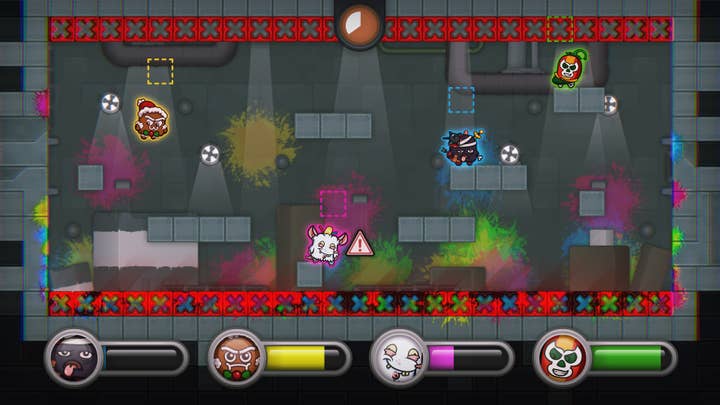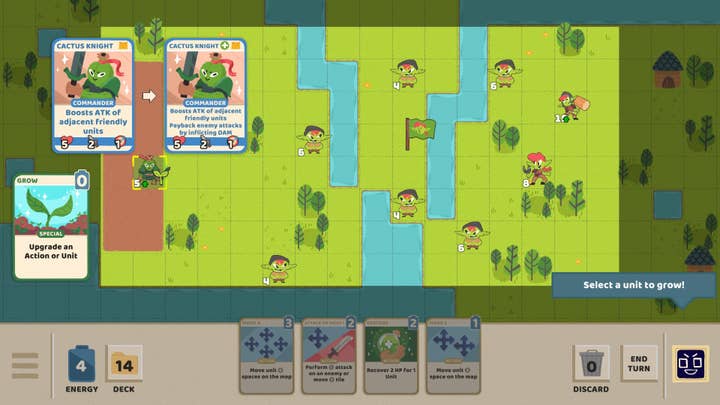Those Awesome Guys' company-wide genre shift
Publishing director Christopher Wulf discusses why the Move or Die developer is embracing publishing and planning a rebrand
For Those Awesome Guys, the success of its first title -- multiplayer party game Move or Die -- meant it could sustain itself for five more years and counting. It meant the studio could grow from its founder working in a studio apartment to 15 or 16 people working in a studio together.
But according to publishing director Christopher Wulf, it also meant the company had been given a very particular identity as a studio that made a specific type of game. Now, he says, Those Awesome Guys wants to start moving away from that identity.
That doesn't mean ending support for Move or Die, but it does mean a shift in philosophy. For starters, Those Awesome Guys is now in the midst of a transition from a studio that only developed games to one that does both development and publishing.
"If there are 20 titles to choose from, the chances of you being the big focus for a partner are low"
Those Awesome Guys' foray into publishing started with Monster Prom, which launched in 2018. Wulf says that when the company first opened itself up to pitches, it had lots of developers pitch more of what the studio was already known for -- multiplayer party games. A visual novel dating sim set at a high school for monsters ended up being exactly the departure it needed.
"It mostly came from this weird spot where Move or Die kept on growing and growing, and we weren't quite ready to jump into a new game project just because Move or Die was still in progress," Wulf says. "But at the same time, with those resources that the company had won through sales and partnerships, and the gained experience over the years, Nic [Nicolae Berbece, CEO] decided it would be a shame to not use those that experience and cash flow while Move or Die is still being kept alive and updated and expanded."

Those Awesome Guys still has a relatively small publishing portfolio: aside from Monster Prom, it recently signed an upcoming title from Rose City Games called Floppy Knights, a cartoony tactical deck builder that was shown for the first time a few months ago at PAX East.
Wulf says that it wants to keep the portfolio relatively small, focusing on a few games at a time across both development and publishing. Part of that is tied in with the company's desire to keep its team small -- it plans to grow to 20 people and stop there -- while still dedicating adequate resources to each project. But he adds that the decision is also motivated by its publishing philosophy.
"We see Floppy Knights and future titles that we're signing as an IP-building process"
"We put a big emphasis on sort of the human element; working with teams for us is always a very close relationship," he says. "And since it's such a direct human interaction between us and the development teams that we work with, there are only so many teams we can sign.
"We've seen in the past with other companies that some of us have been involved with or industry pals, they were maybe game number 20 out of a big publisher's portfolio, and at some point priorities have to be made. And if there are 20 titles to choose from, the chances of you being the big focus for that partner are rather low. Whereas focusing on maybe two to three projects at the same time can give titles the attention that we think they deserve."
So what makes a game a good fit for Those Awesome Guys? Wulf reiterates that even though the studio grew on multiplayer party games, it wants to diversify its portfolio. More specifically, it wants titles that can become proper indie franchises that will span beyond just video games.

For that, he says, a game needs a strong hook, and not necessarily a narrative one. Replayability is key, as is the capacity for a game to foster a strong community of players. And then it needs to be a game that can easily be developed into other types of media. For example, in the case of Floppy Knights, the game's catchy art style is a huge draw.
"We see Floppy Knights and future titles that we're signing as an IP-building process," he says. "We want to be very hands-on and figure out a way to expand the title beyond just a single release, and see if there's potential for sequels, spin-offs, a tabletop game, merchandise or comics. [We're looking at] all these different fields and tapping into many more industries outside of just regular games, which is why we are still comfortable staying small and having people dedicated to those separate fields."
"The name is pretty douchey. Sounds pretty pretentious. And we're also not just guys"
For the most part, Those Awesome Guys seems to be well-positioned to continue its smooth transition from developer to hybrid developer-publisher. It has an unannounced development project in the works, and will continue to consider future publishing deals. But there's one area in which Wulf tells me the company is preparing to make a more dramatic pivot: its name.
"The name is pretty douchey," he says. "[It] sounds pretty pretentious, and we're also not just guys -- that was one major reason. The second one being, with Move or Die and Monster Prom, we developed and published a lot of multiplayer party games. We ended up getting a majority multiplayer party game pitches, which is fun, but we're also not necessarily too keen on just doing this one particular genre. So with Floppy Knights we're sort of going into a new direction, and then with the rebranding, we hope to establish that we're more than just a party game publisher."
Those Awesome Guys isn't ready to reveal what that new name and branding will be just yet -- there's still paperwork to finalize -- but Wulf says that he wants the new name to still have the "charm and humor" that the team had originally been trying to convey, avoiding anything too corporate or boring and staying approachable.
Keeping that approachability and flexibility will be key, too, if Wulf and the other members of Those Awesome Guys are able to execute their plans. For now, it is focused on expanding its publishing and development portfolio to its aforementioned target size. But Wulf is also paying attention to what other, similar indie companies are up to, and if Those Awesome Guys can achieve a certain degree of financial success, he has ideas of where the company could eventually go next.
"Even if things go well, I'd much rather try to also jump into different fields... Take Superhot -- they expanded from just being a developer to also doing Superhot Presents and now IndieBI and all these different cool initiatives that add value to the industry and also fit very well into a company structure or corporate structure.
"That's something I would love to experiment around. And Fellow Traveler does LudoNarraCon, which is a super cool, new experiment and hopefully here to stay. Those kinds of initiatives are something that I would like to be able to point at and tell people, 'This is something that we created.' And that goes beyond just evolving and publishing."

